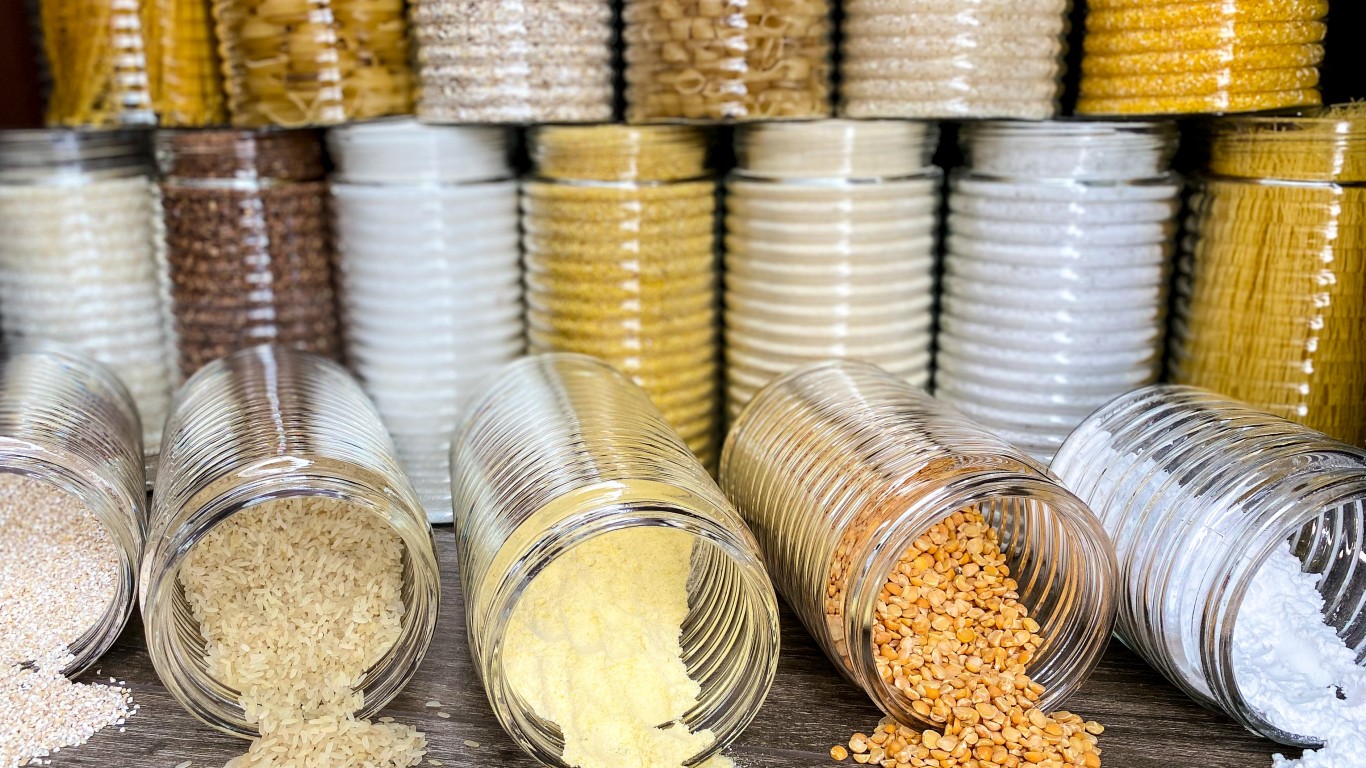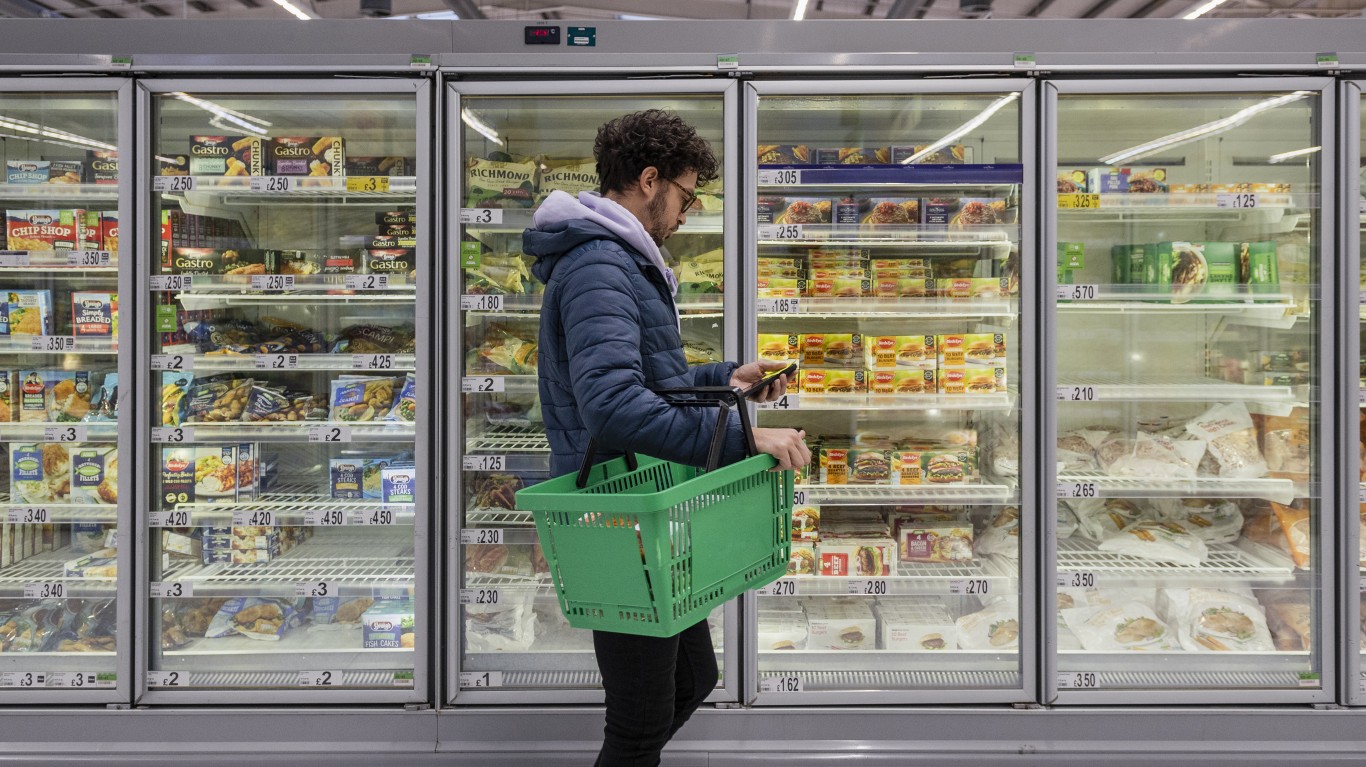Special Report
Prices That Spiked the Most Compared to This Time Last Year

Published:

Inflation cooled in March according to the recent consumer price index report, though many economists believe the move is not permanent. Based on the March CPI – a measure of the costs of U.S. goods and services – inflation rose 5% from a year ago. The number has been closer to 8% for much of 2022.
Though inflation seems to be cooling, the price of some items that many Americans use regularly continues to surge. The price of white bread rose 16% year over year. The price of eggs increased by 36%. And the price of food at elementary and secondary schools soared more than any other, jumping nearly 300% compared to March 2022. (Also see, the biggest food price increases in America’s largest cities.)
Looking at the index’s major components reveals that the cost of shelter rose 8.2% year over year, while the price of energy fell 6.4%.
The drop in energy prices has much to do with oil prices, and oil prices have started to rise again. Despite a Saudi-U.S. pact, several top oil-producing nations of OPEC+, which includes Russia, recently announced production cuts. This will make crude much more scarce in the months ahead and would not only move oil prices up, but also harm the global economy, according to the International Energy Agency. This would increase the odds of recession. (Here are countries with the lowest gas prices in the world at the start of 2023.)
The future of inflationary pressures in the U.S. continues to also hang to a large extent on the plans of the Federal Reserve. Despite the lower inflation figures in March, observers expect the Fed to raise rates again at its next meeting in May. While 5% is better than what inflation has been over the past year, it is still far from the Fed’s target for inflation of 2%.
The Fed has increased rates nine times, by a cumulative 4.75 basis points, since March 2022 to stem inflation. High interest rates cause the economy to slow down but also run the risk of the economy falling into recession. No one has a crystal ball accurate enough to show whether the Fed will raise interest rates one or two more times this year, especially as Fed officials signaled differing opinions in the last meeting, underscoring how fickle inflation could be.
Is the sharp increase in inflation rates over? As of mid-April, the best indicator is probably the price of oil, which helped fuel the last surge in the CPI.
To determine the household items that are soaring in price, 24/7 Wall St. reviewed the Bureau of Labor Statistics’ Consumer Price Index Summary March report. Prices are compared to March 2023.
Click here to see prices that spiked the most compared to this time last year.

40. Frozen noncarbonated juices and drinks
> Price increase, March 2022 to March 2023: +11.1%
[in-text-ad]

39. Soups
> Price increase, March 2022 to March 2023: +11.2%

38. Rice, pasta, cornmeal
> Price increase, March 2022 to March 2023: +11.2%

37. Nonalcoholic beverages and beverage materials
> Price increase, March 2022 to March 2023: +11.3%
[in-text-ad-2]

36. Prepared salads
> Price increase, March 2022 to March 2023: +11.5%

35. Carbonated drinks
> Price increase, March 2022 to March 2023: +11.5%
[in-text-ad]

34. Canned fruits
> Price increase, March 2022 to March 2023: +11.6%
33. Juices and nonalcoholic drinks
> Price increase, March 2022 to March 2023: +11.7%

32. Nonfrozen noncarbonated juices and drinks
> Price increase, March 2022 to March 2023: +11.9%
[in-text-ad-2]

31. Outdoor equipment and supplies
> Price increase, March 2022 to March 2023: +12.1%

30. Miscellaneous household products
> Price increase, March 2022 to March 2023: +12.2%
[in-text-ad]

29. Public transportation
> Price increase, March 2022 to March 2023: +12.4%

28. Breakfast cereal
> Price increase, March 2022 to March 2023: +12.5%

27. Sugar and sugar substitutes
> Price increase, March 2022 to March 2023: +12.7%
[in-text-ad-2]

26. Fresh cakes and cupcakes
> Price increase, March 2022 to March 2023: +13.0%
25. Olives, pickles, relishes
> Price increase, March 2022 to March 2023: +13.1%
[in-text-ad]

24. Crackers, bread, and cracker products
> Price increase, March 2022 to March 2023: +13.6%

23. Cereals and bakery products
> Price increase, March 2022 to March 2023: +13.6%

22. Sauces and gravies
> Price increase, March 2022 to March 2023: +13.7%
[in-text-ad-2]

21. Bread other than white
> Price increase, March 2022 to March 2023: +13.8%

20. Bakery products
> Price increase, March 2022 to March 2023: +13.9%
[in-text-ad]

19. Motor oil, coolant, and fluids
> Price increase, March 2022 to March 2023: +14.2%

18. Pet food
> Price increase, March 2022 to March 2023: +14.4%

17. Motor vehicle insurance
> Price increase, March 2022 to March 2023: +15.0%
[in-text-ad-2]

16. Frozen fruits and vegetables
> Price increase, March 2022 to March 2023: +15.1%

15. Ice cream and related products
> Price increase, March 2022 to March 2023: +15.3%
[in-text-ad]

14. Fats and oils
> Price increase, March 2022 to March 2023: +15.9%

13. Food from vending machines and mobile vendors
> Price increase, March 2022 to March 2023: +16.2%

12. Frozen and refrigerated bakery products, pies, tarts, turnovers
> Price increase, March 2022 to March 2023: +16.2%
[in-text-ad-2]

11. Salad dressing
> Price increase, March 2022 to March 2023: +16.4%

10. White bread
> Price increase, March 2022 to March 2023: +16.5%
[in-text-ad]

9. Cookies
> Price increase, March 2022 to March 2023: +16.6%

8. Motor vehicle repair
> Price increase, March 2022 to March 2023: +17.4%

7. Flour and prepared flour mixes
> Price increase, March 2022 to March 2023: +17.5%
[in-text-ad-2]
6. Airline fares
> Price increase, March 2022 to March 2023: +17.7%

5. Frozen vegetables
> Price increase, March 2022 to March 2023: +20.1%
[in-text-ad]

4. Margarine
> Price increase, March 2022 to March 2023: +33.4%

3. Eggs
> Price increase, March 2022 to March 2023: +36.0%

2. Food at employee sites and schools
> Price increase, March 2022 to March 2023: +131.3%
[in-text-ad-2]

1. Food at elementary and secondary schools
> Price increase, March 2022 to March 2023: +296.3%
Retirement planning doesn’t have to feel overwhelming. The key is finding expert guidance—and SmartAsset’s simple quiz makes it easier than ever for you to connect with a vetted financial advisor.
Here’s how it works:
Why wait? Start building the retirement you’ve always dreamed of. Click here to get started today!
Thank you for reading! Have some feedback for us?
Contact the 24/7 Wall St. editorial team.